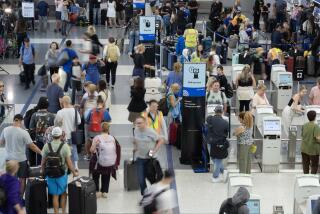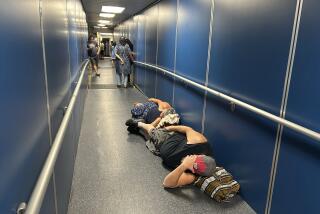Suspicious Shoes Shut Down Part of San Francisco Airport
A man with suspicious residue on his shoes set off a security alert that shut down part of San Francisco International Airport on Wednesday morning, forcing the evacuation of thousands of passengers and the diversion of two jetliners.
But the havoc created by the incident did not affect the traveler with the suspect loafers, who walked off with his shoes before he could be questioned by authorities.
A screening machine detected the potentially volatile substance on the shoes, leading to the shutdown of the airportâs domestic airline terminal for more than three hours during the morning rush hour.
Officials later said the substance could have been innocuous, clinging to the manâs shoes in trace amounts.
The middle-aged traveler apparently left the security checkpoint unaware that the high-tech screening device had signaled a problem with his shoes. He is not considered a criminal suspect.
Screening employees have focused more rigorously on passengersâ shoes since December, when British citizen Richard C. Reid allegedly tried to blow up a Miami-bound American Airlines jet with explosives hidden in his sneakers.
The incident is the latest in a string of evacuations triggered by security breaches at airports nationwide in the months after the September terrorist attacks.
Passengers were forced to disembark from planes parked at the gates and join others outside in the cold morning air.
The man, described by airport officials as white, about 5 feet 11, and in his 40s, so flummoxed airport and airline employees that they worried he might have boarded a plane and made it into the sky.
United diverted two flights bound for the East Coast that left San Francisco in the 10 minutes after the disappearance. Both flights, originally bound for New York and Washington, were sent to Chicagoâs OâHare International Airport, where the planes and passengers were searched by bomb sniffing dogs. A third plane from San Francisco, bound for Chicago, was searched when it landed at OâHare at midday, said Joe Hopkins, media relations manager for United Airlines.
âThe possibility existed that this person got on one of those airplanes,â Hopkins said. âThis is not unprecedented. This has happened at other airports. Our view is that we will be conservative and that safety is more important than inconveniencing people.â
The man went through security at the airportâs crowded domestic terminal about 6:35 a.m. and was randomly selected for a shoe check by Argenbright Security Inc. employees, who operate security checkpoints at San Francisco for United.
He stepped to the side, and an employee ran a metal instrument with a cloth attached to the end over his brown penny loafers. Then the cloth was taken off and put into a machine that detected a trace of suspicious residue, said Mike McCarron, an airport spokesman.
When the monitor momentarily turned away to look for a supervisor to discuss the results, the man figured he was finished and took the shoes off the table and walked away, McCarron said. When the employee turned around, the shoe owner was gone, along with his loafers.
The monitor contacted a supervisor, who called a security alert. Officials began evacuating the facility.
âHis bags went through and they came out clear with no residue on them,â McCarron said. âHis shoes must have had incidental contact with fertilizer or something that caused the machine to come up positive.â
He added that the man âcould be totally unaware he was the source of thisâ and most likely stood outside with other evacuated passengers waiting for officials to clear the terminal.
Up to 3,000 people were evacuated from the United terminal, which was reopened about 10 a.m. The incident threw off Unitedâs schedule for most of the day at one of its major Western hubs, officials said.
The Federal Aviation Administration is investigating the security breach to determine what went wrong, McCarron said. âIt appears the security employee wasnât following standard procedure by keeping an eye on the customer and the shoes,â he said.
The incident underscores the effectiveness of some 700 âtrace detectionâ machines in place at airports around the country, security experts said. The machines were purchased by the federal government in the mid-â90s, and airlines were required to use them to randomly check passengersâ belongings and bags for suspicious substances.
âThey provide an extra layer as far as explosives detection goes,â said Thomas Hartwick, chairman of a National Academy of Sciences panel on aviation security. âIf you were a terrorist building a bomb you could build it in many shapes. Molecules are only built in one way--so these machines have an advantage over X-ray machines, where theyâre trying to detect shape.â
But security experts expressed concern about a pattern of security breaches at the nationâs commercial airports since Sept. 11.
âThis has happened over and over,â said Michael Boyd, president of the Boyd Group, an aviation consulting firm in Evergreen, Colo. Indeed, in the last few months there have been numerous security breaches at commercial airports. A sampling:
On Jan. 26, a security guard allowed an impatient passenger to slip past a screening checkpoint at St. Louisâ Lambert Field, forcing an evacuation and delaying 3,900 passengers and 70 flights.
On Jan. 16, a passenger walked past security screeners at Detroitâs Metro Airport, delaying 35 Northwest Airlines flights.
On Jan. 4, a traveler in a wheelchair bypassed security, forcing the shutdown of three wings at Portland International Airport.
On Christmas, a terminal at Las Vegasâ McCarran International Airport was evacuated after two people rushed through a security gate.
More to Read
Sign up for Essential California
The most important California stories and recommendations in your inbox every morning.
You may occasionally receive promotional content from the Los Angeles Times.










